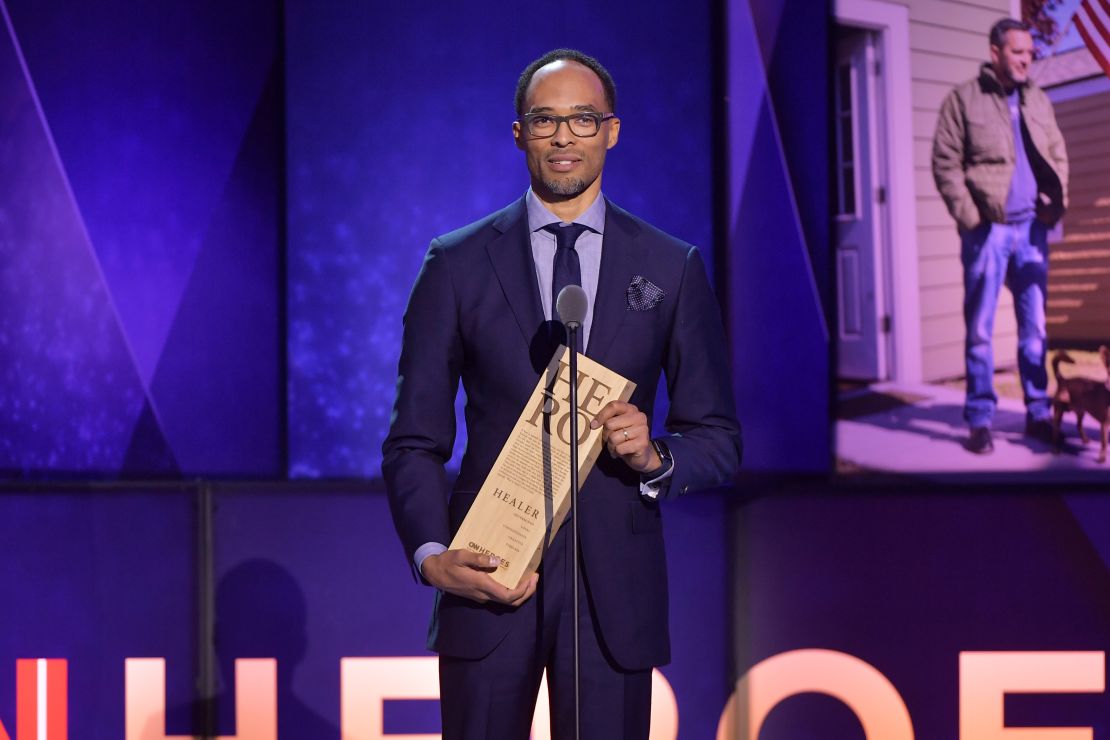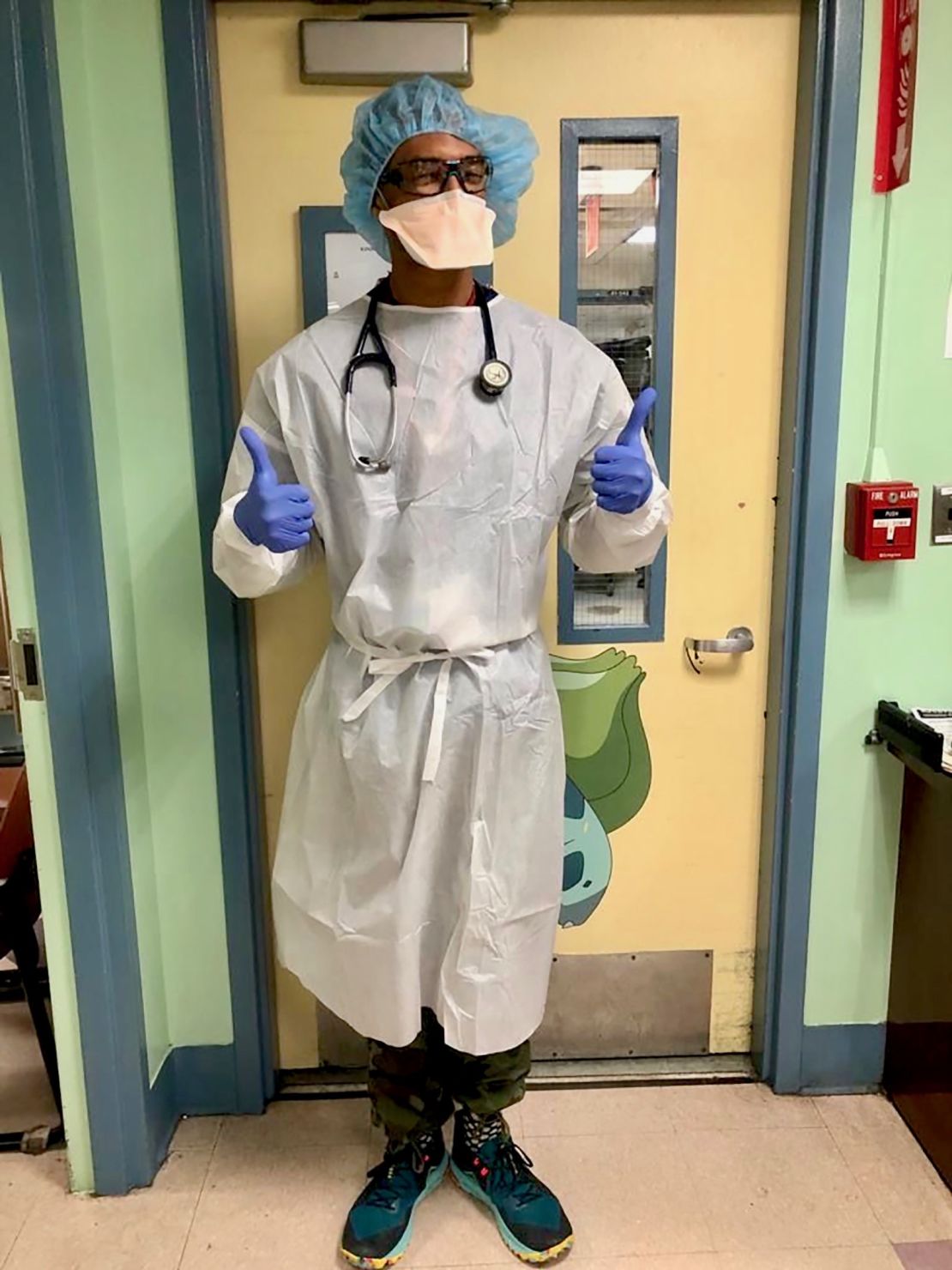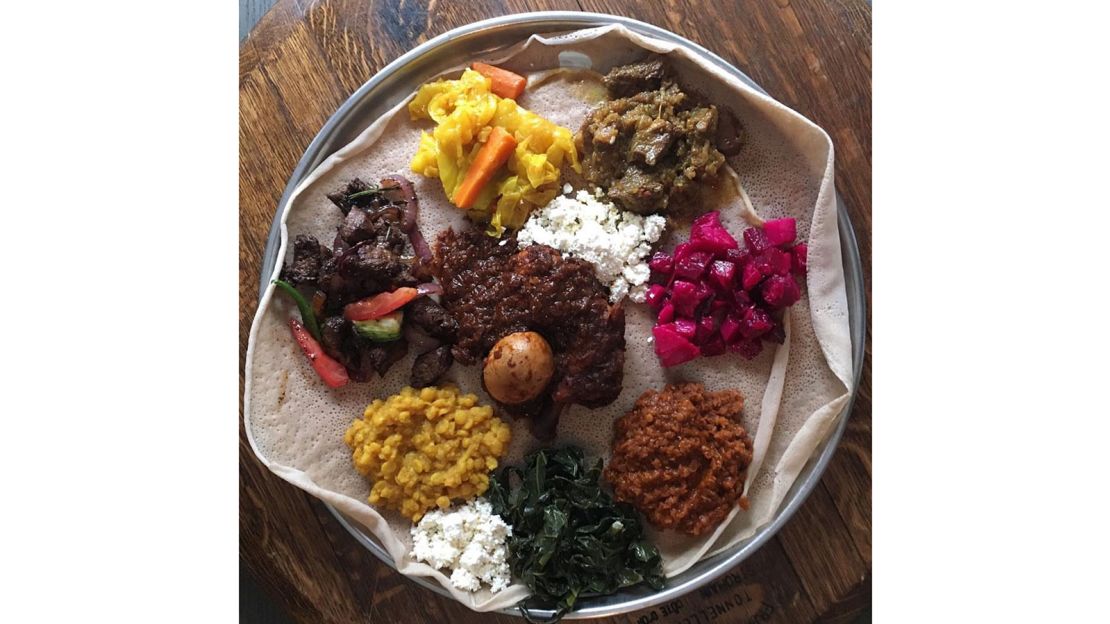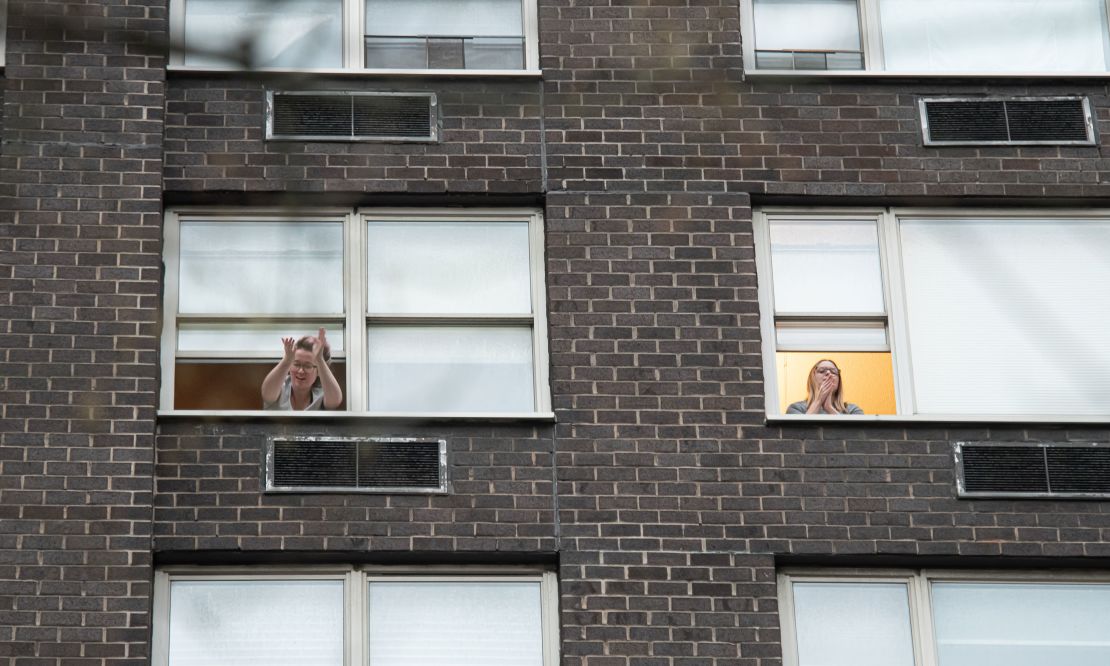Dr. Rob Gore stands in the doorway of his Brooklyn brownstone.
He’s wearing an N95 mask – something he never imagined he’d have to do in his own home.
His wife, Hibist Legesse, has been telling him their baby’s kicking like crazy. He wishes he could reach over and feel it, too.
But Legesse is sitting across the room on a couch more than 10 feet away. And for weeks, this is as close to each other as they’ve been able to get.
Legesse is pregnant, coronavirus cases are climbing and they don’t want to put their unborn child at risk.
Gore’s just stopping by to pick up a package. Then he’ll head back to the apartment where he’s staying, and Legesse will get back to work.
In a matter of hours last month, they returned from the joy of a beach vacation to a jarring reality.
The city they call home has become a hotspot in a pandemic with no end in sight, and in very different ways, both of them are on the front lines.
He’s an emergency room doctor racing to save lives. She’s a restaurant owner scrambling to keep her business afloat. And soon, they’ll be parents for the first time.
He’s fighting to save patients’ lives
An ominous refrain keeps coming through the hospital loudspeakers.
Code 99…Code 99…Code 99
For Gore, it’s a reminder of the danger lurking at SUNY Downstate Medical Center, where intensive care units have been packed with more people on ventilators than he’s ever seen.
In hospital parlance, “Code 99” means cardiac arrest. These days, Gore says it’s likely to mean that someone has died, because Covid-19 has killed them.
Gore pushes forward, compartmentalizes his fears and stays focused on his patients. When he’s in the ER, he knows any distraction could be the difference between life and death.
New York had just confirmed its first coronavirus case when Gore and his wife headed to the Bahamas for a beach vacation in early March. By the time they returned, their city was becoming the epicenter of a fast-moving outbreak.
The virus wasn’t a threat in a faraway place anymore. It was personal.
Gore grew up in Fort Greene and Flatbush. His elementary school is just down the street from the hospital where he works. And it seems like every day he gets a text message from a friend asking for help
Can you check on my father?
Can you check on my mom?
My aunt’s there.
My neighbor’s there.
We just want somebody we know to check on him.
Some of Gore’s friends and coworkers have been getting sick, too. The 43-year-old doctor has seen patients that are his age and younger. And the very health disparities that drove him to become a doctor in the first place are becoming national news.
Gore was named a CNN Hero in 2018 for his work with the Kings Against Violence Initiative, a nonprofit he founded in 2009 to help at-risk students. He told CNN he’d been frustrated by how many young men of color he saw being hurt and killed from street violence and wanted to break the cycle.

Now Gore says health disparities are playing out in another devastating way, as marginalized communities are disproportionately impacted by the novel coronavirus.
“You can take any disease process on the planet, and if you put it in a poor, underdeveloped, unsupported area, it’s going to manifest and it’s going to devastate that entire community,” he says, “and that’s what we’re seeing here in the United States right now.”
The disaster he’s seeing in his own country is weighing on him now, every time he heads to the hospital. And he’s doing everything he can to help.
But this isn’t the only battle he has to fight.
They’re searching for answers together
As Gore saw coronavirus cases spiking in the ER, anxiety over how the illness could affect his family was soaring at home.
It wasn’t long before Gore and Legesse settled on a solution: He would move into an Airbnb. It was a difficult decision, but they took it in stride. He wouldn’t be far away, only about a 10-minute drive from their home. They knew they were lucky to have the option. And at the time it seemed like such a temporary thing.

Then one week became two, and two weeks became three, and three weeks became four, and four weeks became who-knows-how-many more.
He lived in a few Airbnb locations, then switched to renting an apartment as the days wore on.
Through it all, questions keep popping up in Gore’s mind.
Will I get sick?
Is it happening to me?
When can I get back to my family?
When is this going to end?
Legesse has been grilling her husband with questions of her own.
When he went back to the ER after their vacation, she was terrified he’d get sick. She asked if he was doing enough to protect himself.
In a Facetime call, he showed her all the protective gear he had.
Two masks, a face shield, goggles, a jumpsuit, booties and a cap covering his head.

Seeing it helped, even from afar. Legesse says she’s proud of the way he’s serving the community and worrying less now about whether he’ll get sick.
Lately she’s been thinking more about everything he’s missing during their time apart.
They’ve postponed plans to set up a nursery. They’re swapping baby name ideas in text messages. He’s not home to feel the kicking or to see the way her body’s changing every day.
Their baby boy is due in July. She hopes by then they’ll all be together.
She’s fighting to keep her restaurant afloat
At first, they were both so busy they barely noticed the strain of separation.
Legesse’s days have been frenzied ever since her restaurant in Brooklyn’s Fort Greene neighborhood, Bati Ethiopian Kitchen, was forced to close its dining room and lay off most of its staff.
Legesse, a co-owner, has been scrambling to help employees she’s known for years file for unemployment. And she’s spent days applying for numerous state and federal grants and loans.
But so far, she hasn’t heard back about any of them. The wait is agonizing. And word that big companies got loans that should have gone to small businesses has left her feeling lost and frustrated.

The normally packed restaurant’s 12 tables are sitting empty. Only one full-time employee remains: a cook who’s still serving up take-out and delivery orders.
But Legesse says the money the restaurant is making right now isn’t enough. Without support from financial relief programs, she says at the end of the month she won’t have enough left over to pay rent.
“We’re completely stuck, with no answers, no help. From the beginning, the government was saying, ‘Small businesses will not be left behind. They are the backbone of the economy,’” she says. “That positive feeling that you have is turning into fear now. As the days turn into weeks and months, you don’t know if you’re going to reopen. You don’t know what life is going to be like for your business.”
This isn’t the first time the restaurant has struggled. Legesse remembers its first days, opening in 2009 during the Great Recession. It was a frigid week in January, and things kept going wrong. The heating system failed, and for a moment, she feared the restaurant she’d dreamed of opening would have to close its doors. Then she looked out at the dining room and saw people were still sampling her family’s recipes – bundled up in coats and scarves as they ate.

More than a decade later, she’s hoping lessons she learned during the restaurant’s opening days will help her weather this new crisis.
“When you’re doing something during such a challenging time, you’re not going to die from it. You’re going to come out of it strong. You’re going to figure it out. You’re going to problem solve,” she says. “The recession showed us – we were definitely worried that people were not going to want to come in and spend money, but they did, and it was busy right from the start.”
Legesse grew up in the Ethiopian capital and immigrated to New York as a high school student. The name of her restaurant has two meanings: Bati is an Ethiopian city known for its vibrant market; it’s also a type of musical scale. She hoped the restaurant would embody both things: bringing people together and creating the rhythm of community.
And for Legesse, it has. It’s a business she’s lived and breathed and loved for years. And she’s determined to save it.
The restaurant has brought her employees and customers who she feels are like family. And unexpectedly, it brought her a husband, too.
Bati is where she and Gore first met.
He dined there frequently. And what started as a simple hello after a friend introduced them one day blossomed into a romance neither one of them expected.

They’re fighting to keep their baby safe
These days, being apart is getting tougher, even though Gore and Legesse know they’re lucky to be able to visit from time to time.
It’s been more than four weeks since they last embraced. His check-ins from the front stoop have become less frequent as work in the ER intensifies. When they do meet, it’s something to savor.
So on this Friday evening, when Gore stops by to pick up a package, that’s exactly what he’s trying to do. He’s in the doorway. She’s sitting on the couch. And he’s drinking it in.
He loves seeing her and hearing how laser-focused she is on making sure the restaurant can stay open. Some people would crumble under the stress, but she just gets more organized.
Usually this is the time when he’ll pull out his phone and snap a quick photo of Legesse from across the room.

He wants to remember these moments, and the way her womb is growing. It seems like she looks different every time he sees her, even when only a few days have passed.
But on this day, something different happens as Gore stands there, the front door wide open behind him.
Legesse hears the sound that’s been giving her goosebumps for weeks.
Cheers and applause are erupting around the neighborhood.
It’s 7 p.m., when New Yorkers have taken to leaning out windows and stepping onto fire escapes to show their support for health care workers.

Gore’s never been home before to hear it.
Legesse gets up off the couch.
And she starts clapping.
She has tears in her eyes. She thinks her husband does, too, though it’s hard to see his face very clearly behind the mask.
After a few minutes, the noise dies down. They stand there, a room apart – overwhelmed by the emotion of the moment.
They don’t know their baby’s name yet.
They don’t know what the world he’s born into will look like.
They don’t know whether he’ll be able to go to daycare – whether there will even be daycare.
They don’t know when they’ll be back to living under the same roof.
But they do know this: They are together right now – and every day – even when they are 10 feet or a 10-minute drive apart. And their community is with them, too.
This is the story they will tell their son someday – the story of standing together.


